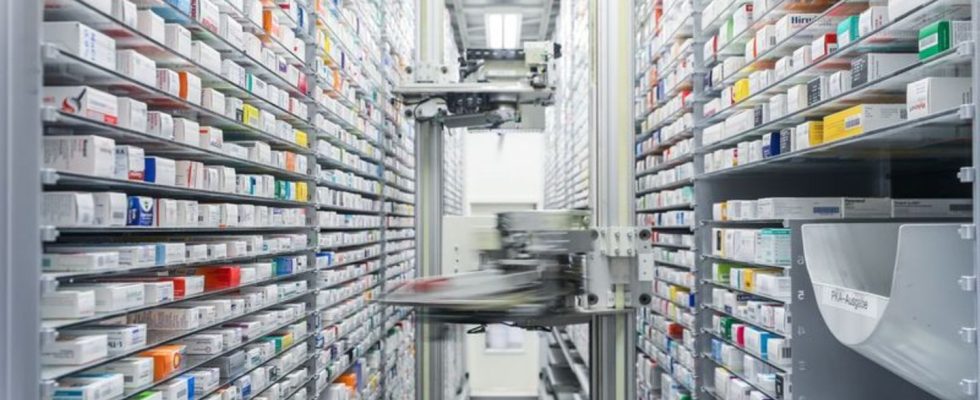Health
Shortage of medication: Pediatricians’ call for help
The drug store of a pharmacy. photo
© Jan Woitas/dpa
Fever juice was already scarce in winter. Because many parents are no longer getting antibiotics for their children, paediatricians from several European countries are appealing to politicians for help.
Pediatricians from several European countries have written a letter to the health ministers of their countries appealing for action to be taken against the shortage of pediatric medicines. “The health of our children and young people is at risk throughout Europe due to the lack of medicines. A quick, reliable and permanent solution is urgently needed!”, It says in the letter that became known on Saturday. According to the professional association of paediatricians (BVKJ), it went to Federal Health Minister Karl Lauterbach (SPD), among others.
The “Neue Osnabrücker Zeitung” (NOZ) had first reported on it. The letter is dated April 27th and is addressed to the ministers of health in Germany, France, Austria, Switzerland and South Tyrol (Italy) and is signed by the pediatrician associations there. BVKJ President Thomas Fischbach was one of the co-signers. There is a lack of fever and pain medication in dosage forms suitable for children. The antibiotic penicillin does not currently exist either, he told the NOZ.
Antibiotics are prescribed, for example, for pneumonia, urinary tract infections or scarlet fever. According to the BVKJ, if the right preparation is not available, a second or third choice antibiotic must be used, which is less effective and increases the risk of antibiotic resistance developing.
Children’s health “permanently endangered”
In their letter, the doctors warn: “The bottlenecks of the last few months mean that treatments that are neither suitable for children nor based on therapy guidelines are possible.” The health of children and young people is thereby endangered in the long term. Just a few years ago, this scenario of a supply shortage was “not even remotely” imaginable.
The shortage of antibiotic juices for children in Germany has even been official since Tuesday: The Federal Ministry of Health had announced in the Federal Gazette, the official announcement platform of the Federal Republic, that such a shortage of supply currently exists. This means that certain active ingredients are currently not available, as a spokesman explained on Friday.
With the announcement, the strict rules that normally apply to the medicinal products concerned were relaxed somewhat for a limited period of time. For example, authorities could now also make it possible for pharmacies in this country to dispense a drug from Spain that has no German packaging, explained the spokesman for the Central Association of Statutory Health Insurance Funds (GKV), Florian Lanz, on Saturday.
Health insurance companies blame the pharmaceutical industry
According to the Federal Ministry of Health, there are many reasons for supply bottlenecks in medicines. Reference is made to “bottlenecks in raw materials” or “production problems”. The National Association of Statutory Health Insurance Funds blames the pharmaceutical industry: “There was a common trust in the pharmaceutical industry that, in case of doubt, it would ensure the care of patients. This trust has now been shaken,” said Lanz. The industry has historically built supply chains with manufacturing facilities overseas that are now proving to be unstable.
At the beginning of April, the federal government introduced a law to combat bottlenecks. However, it has not yet been decided by the Bundestag. It is intended to enable manufacturers to charge higher sales prices for children’s medicines in Germany, so that deliveries to Germany are more worthwhile. In the case of important medicines, there is also an obligation to store them for several months. And in the case of antibiotics, manufacturers who produce active ingredients in Europe should be given a greater say.
The explanatory memorandum to the law states that for certain medicines containing antibiotics, more than 60 percent of the active ingredient production now takes place in Asia, compared to 30 percent twenty years ago. The new regulation is intended to reduce dependencies and ensure more stability. The health policy spokesman for the Union faction, Tino Sorge (CDU), criticized on Saturday that the traffic light bill would only solve some of the problems. “First of all, the law comes months late,” he added.
Problem extends beyond children’s medication
According to the German Foundation for Patient Protection, the drug problem goes far beyond pediatric drugs. “Everywhere chronically ill people suffer from the sluggish supply of basic medicines. Blood fat reducers, blood pressure medicines, even cancer drugs are in short supply,” said board member Eugen Brysch of the dpa. The previous national and European measures were not sufficient to ensure patient care.

